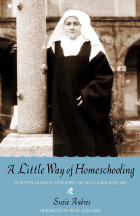Catholic homeschoolers seem to gravitate toward structured programs more than the general homeschool population, yet there are many Catholic homeschoolers who buck that trend. A Little Way of Homeschooling presents the stories of thirteen such families.
Only one of the families seems to fit into the “radical unschooling” category—they allow their children to decide when, what, and how to learn with minimal to no mandates from parents. The other families reflect the more common actuality of unschooling in its many forms. They vary in the amount of freedom they give their children, and they vary in the ways their children learn. Some actually use textbooks or workbooks when children choose to do so. Some waffle back and forth between a more structured approach and unschooling.
The idea of unschooling seems more problematic to most Catholic homeschoolers than it is to others, and many of the families in this book struggled with the concept, wanting to make sure that they were teaching their children in a way that didn’t contradict their Catholic beliefs. Some struggled with the belief held by many secular unschoolers that children are innately good and that parents need to allow a child freedom to shape his or her own life in any way they wish. However, the families in this book as well as many other Christian unschoolers have discovered that it is possible to raise a child in a way that recognizes the sin nature of the child and helps form a child’s conscience and habits accordingly, while at the same time providing much more freedom in the realm of education than is commonly given.
Many of the mothers in this book are very highly educated, and this seems to have posed challenges to some of them. Their own preconceptions about education and their own experiences often didn’t translate into educational methods that worked with their own children. They had to in some ways free themselves from their own expectations as well as the expectations of those around them to do what was best for their children in their homeschooling.
The reference to a “little way” in the title reflects the influence and example of St. Therese of Lisieux whose “little way” of spirituality continues to inspire people all over the world. The gentleness of St. Therese is a constant theme. Suzie Andres, author of two chapters and editor of the book, explains: “Just as we love God because He first loved us, so we are able to be gentle with ourselves and others because He has first been gentle with us. The saints by their intercession, their teachings, and their example contribute to our experience and understanding of gentleness. Finally, having been the recipients of so much heavenly gentleness and inspired by the Holy Spirit, we are in a position to let this divine attribute shine through us and onto those around us. The book you are holding tells of the adventures of thirteen women as they attempt to follow the advice of St Therese to trust God and be gentle” (p. 169).
While this book is clearly about Catholic unschoolers, it is also one of the best on unschooling in general. Through the different stories, we see the common thread of concern for the individual nature of each child and a rejection of the prevalent school model that treats children like programmable machines. Because of that, learning is viewed by unschoolers as a normal part of life that does not need to be scheduled and forced. Instead learning is an integral part of life that takes place whenever and however seems best. One mother remarks, “It has taken me time to see that learning is secondary to living well, or at least only one integral part of living well, rather than something that precedes living. We have found that unschooling is not merely about a child’s education at home—but also about that child’s life, today, tomorrow, and always” (p. 110).
In addition, a number of the contributing writers are also bloggers. That writing experience translates into exceptionally well-written stories. The book also seems to have just the right mix of various experiences so that the thirteen stories convey the variety of unschooling experiences without being redundant.
A Little Way of Homeschooling was written for a Catholic audience. However, Christians from other denominations should find the stories equally compelling and inspiring. (Note: The first chapter and the epilogue are explicitly Catholic, and authors often mention Catholic beliefs and practices in their stories.) Christians in general should also appreciate the first appendix, “A Philosopher’s Perspective” by Tony Andres, the author’s husband. Since Tony Andres has a doctorate in philosophy from the University of Notre Dame, he is equipped to answer the question of whether or not unschooling is compatible with the Church’s teaching. He does so in the affirmative with a very interesting explanation. Another appendix offers lists of recommended resources compiled from all of the contributing authors that aspiring unschoolers as well as other Catholic homeschoolers should find valuable.
I have rarely reviewed books on approaches to education in recent years because most seem to repeat what’s already been said elsewhere, but A Little Way of Homeschooling deserves to be an exception!
The book is available in print and digital editions.








